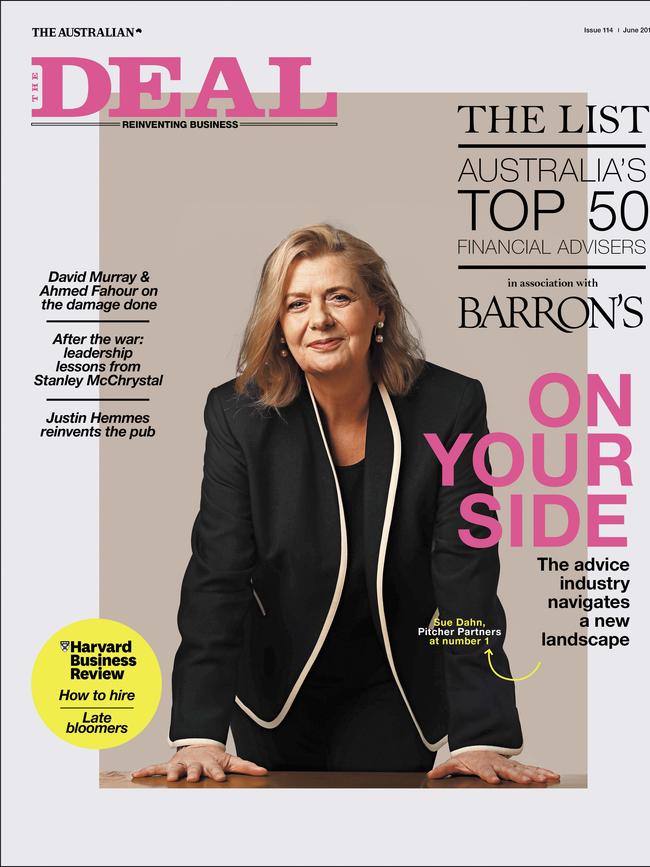After the pandemic, it’s time for a reset
The Australian and Barron’s list of 100 Top Financial Adivisers comes as the sector faces opportunities and challenges in the year of the devastating COVID-19.

For many financial advisers sheer survival will be enough reward in what will continue to be a tough year. But for the elite professionals in this year’s Top 100 Financial Advisers list, 2020 could mark a new beginning.
Every industry across the nation’s economy will have its own version of a post-pandemic recovery, but financial advisers must go a little further than that. The sector has to rebuild a professional reputation that was torched by the Hayne royal commission, an exercise made worse as the nation’s biggest banks walked away from the area.
In short, the sector is shell-shocked. In fact, it is shrinking as some financial institutions give up on the now maligned notion of vertical integration under which a company can create financial products, then sell those same products. The end result is a generation leaving the industry in the face of higher standards and an unavoidable one-size-fits-all national exam that every adviser in Australia must pass.
“The looming pressure of new national standards has meant a higher hurdle, so I’m not surprised to see advisers leaving the industry, but you know, you will not be getting the best advisers leaving,” says Sue Dahn, of Pitcher Partners, who ranked No 1 in our survey last year.
Thousands are leaving the industry each year. In the first quarter of this year, the overall reduction in adviser numbers was 678 as only 12 new advisers joined the ranks.
Inside the sector, factional battles still rage over standards and regulations, not to mention the nature of the job.

The Financial Planning Association of Australia recently floated a plan to introduce individual licences — a per capita system that would prevent many of the crimes and misdemeanours perpetrated by some working “under licence” at a larger group.
For our top 100 many of these issues are academic. They are well-qualified operators, regarded as the best in the business. Our list members are in demand: take this year’s top-placed adviser Garth Hu, who has built an unparalleled reputation in the local market as a Morgan Stanley adviser with strong links to Chinese high-net-worth families.
Their time is precious. Ask anyone on our list how they fared during the coronavirus crisis and you get a similar answer: “We had triple the usual level of calls, triple the usual levels of meetings, we held a lot of hands.”
Will Hamilton, of Hamilton Wealth Management, a list veteran, says: “I’ve never been so busy in my life. At the peak of the crisis we were communicating non-stop with the client base. By June it was back to normal … but it’s a new normal.”
In full: The List - Australia’s 100 Top Financial Advisers
The dimensions of this new normal are still being digested by advisers at all levels: financial advisers need to offer a clearer value proposition than ever yet the regulations they face have just become more onerous.
Dante De Gori, the chief executive of the Financial Planning Association, says: “Our members are facing more regulations, higher education standards and increased costs, at the same time there is an ever greater need for advice.”
Yet progress is being made.
The sector has a new standards body in full swing — the Financial Adviser Standards and Ethics Authority — and a new minister, Jane Hume, who has been on the front foot pushing for more technologically adept advisers to scale their services.
At last some of the most controversial legacy issues in financial advice have been buried — the so-called “grandfathered commissions” that were still allowed after the last round of reforms in 2014 are illegal from January next year. Similarly, a lucrative business in so-called stamping fee commissions in relation to listed investment companies has been terminated.
The behavioural standards in the industry appear to have at least stabilised. Australian Financial Complaints Authority chief executive David Locke says although complaints on all issues filed to his office increased during the pandemic, the complaints against financial advisers remained steady during March and April.
Crucially, as the industry evolves, it is also diversifying with two layers of financial advice emerging: for the wealthy there is expensive one-on-one advice, often delivered under the so-called “sophisticated investor” regime, while at the other end of the advice spectrum are the robo advice or digi-finance online specialists offering services for a couple of hundred dollars. This compares with full-service financial advice that costs close to $3000 a year.

In between is the gap where middle-of-the-road clients will struggle for appropriate service. It’s the biggest issue facing financial advice customers and a challenge for the wider industry.
Already there are signs this middle group is once more being examined as a potential market by foreign banks such as Citi and Credit Suisse. Mid-sized local operations such as Clime Investment Group have moved deeper into wealth management for this sector.
Meanwhile the best advisers navigate the legal and political minefields of their profession in the pursuit of their single most important task — looking after their clients.
It’s a world in which every adviser must sit the national exam and comply with FASEA’s new ethics code. The original deadline for this new regime was January next year but this has now been pushed out to January 2022.
Dahn, the first woman to get to the top of the list, says: “The sector might have a smaller working population but it is clearly improving. The royal commission followed by the demands of the pandemic lockdown has made sure of that. I would not underestimate the power of the new FASEA code of ethics — it is going to change things.”





